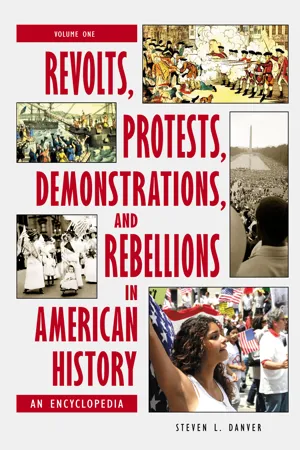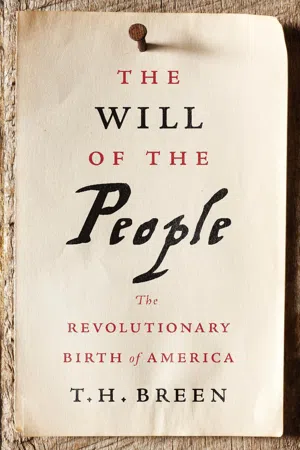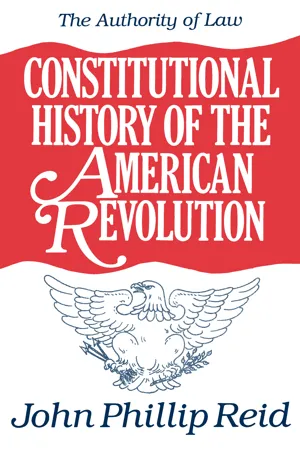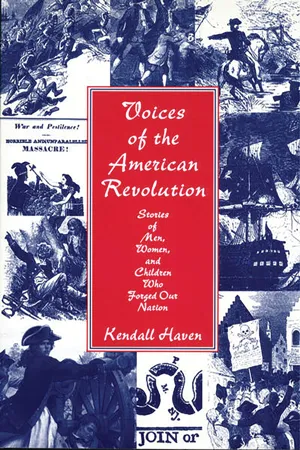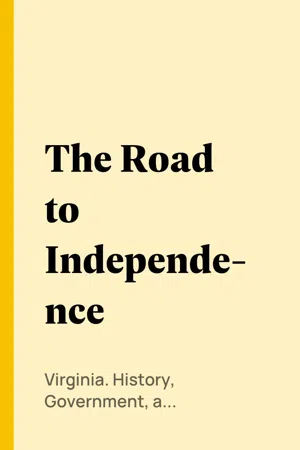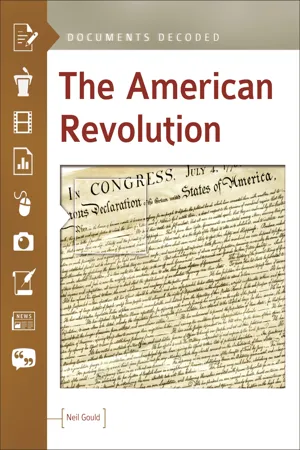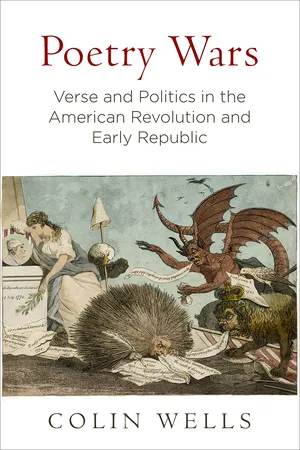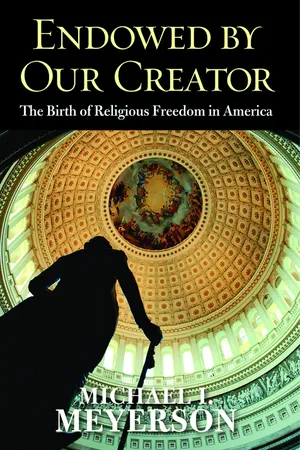History
Intolerable Acts
The Intolerable Acts were a series of punitive measures imposed by the British Parliament on the American colonies in 1774 in response to the Boston Tea Party. The acts included the closure of the port of Boston, the restriction of town meetings, and the quartering of British troops in private homes. These measures further fueled the growing tensions between the colonies and Britain, ultimately leading to the American Revolutionary War.
Written by Perlego with AI-assistance
Related key terms
1 of 5
11 Key excerpts on "Intolerable Acts"
- eBook - PDF
- John E. Findling, Frank W. Thackeray, John E. Findling, Frank W. Thackeray(Authors)
- 2010(Publication Date)
- ABC-CLIO(Publisher)
Furthermore, the agitators readily created the be- lievable impression that the Quebec Act was meant to hem in the colonies and to cut off their growth. With good reason, colonists quickly labeled the acts the Intolerable Acts. To make sure Massachusetts knuckled under, the British sent Gen. Thomas Gage and four regiments of redcoats to the colony, with Gage as governor and the troops as a kind of palace guard. Gage had long been a strong believer in Britain’s authority over colonial affairs. He had been in the colonies off and on for nearly years, and from he had served as commander in chief for North America, with large responsibili- ties and frequent contact with London authorities. In , he wrote, “The Colonists are taking great steps toward Independence; it concerns Great Britain by a speedy and spirited conduct to show them that these colonies are British colonies dependent on her and that they are not independent states.” In , somewhat more bluntly, Gage wrote, “My private opinion is that America is a mere bully, from one end to the other, and the THE BOSTON TEA PARTY, 1773 119 Bostonians by far the greatest bullies, and I think you will find them so upon trial.” And, by , the year of the Intolerable Acts, Gage had become a real hawk: “If you will re- sist and not yield, that resistance should be effective at the beginning. If you think ten thousand men sufficient, send twenty, if one million pounds is thought enough, give two, [and] you will save both blood and treasure in the end.” Other British officials had similarly low opinions of the colonists. A Boston customs official, Henry Hulton, wrote in : “They [the colonists] are a most rude, depraved, degenerate race, and it is a mortification to us that they speak English and can trace themselves from that stock.” The American response to the Intolerable Acts was to convene the First Continental Congress, at Carpenter’s Hall, in Philadelphia, on September , . - eBook - PDF
Revolts, Protests, Demonstrations, and Rebellions in American History
An Encyclopedia [3 volumes]
- Steven L. Danver(Author)
- 2010(Publication Date)
- ABC-CLIO(Publisher)
The Coercive Acts and the Quebec Act reached far beyond Massachusetts. Together, all these acts confirmed fears of many colonists that Parliament would oppress all their rights. After all, if Parliament could close a port in Boston, what was to stop them from closing a port in New York, South Carolina, or Virginia? 199 If they could change the charter of Massachusetts, what would prevent them from changing the charters of the other 12 colonies? In the quest to keep colonists in their place, the British government inadvertently stirred up revolutionary spirit and set them on the road to independence. —Lorri Brown Further Reading Faragher, John Mack, Mari Jo Buhle, Daniel Czitrom, and Susan H. Armitage. Out of Many: A History of the American People. Upper Saddle River, NJ: Prentice Hall, 1995. Norton, Mary Beth, David M. Katzman, Paul D. Scott, Howard P. Chudacoff, and Thomas G. Patterson. A People and a Nation: A History of the United States. Boston: Houghton Mifflin Company, 1994. USHistory.org. “The Intolerable Acts.” http://www.ushistory.org/declaration/related/ intolerable.htm (accessed August 23, 2008). First Continental Congress (1774) Following the Boston Tea Party and the Coercive Acts, American colonists began to realize that their interests differed from those of Great Britain, both culturally and economically. By the summer of 1774, concerns and unrest grew so much among the colonists that they decided hold a meeting to figure out the best way to deal with the unjust laws and taxation imposed upon them by King George III and Parliament. Fifty-five delegates from 12 colonies (Georgia did not send anyone) convened on September 5, 1774, at Carpenter’s Hall in Philadelphia, to discuss the needs and concerns of their respective colonies. The delegates who gathered in Philadelphia were mainly merchants, lawyers, or planters. - eBook - PDF
The Will of the People
The Revolutionary Birth of America
- T. H. Breen(Author)
- 2019(Publication Date)
- Belknap Press(Publisher)
One representative insisted that “the flagi-tiousness of the offense”—dumping the tea into Boston Harbor—fully justified the belief that “the town of Boston ought to be knocked about their ears, and destroyed.”30 Such jingoistic declarations played well in England. More to the point, they circulated in the London newspapers that eventually reached Amer-ica, fueling even greater popular discontent. A few members of Parliament remained skeptical of the punitive policy—a show of toughness in the ab-sence of constructive remedy—and confronting North they warned that the Coercive Acts will “soon inflame all America, and stir up a contention you will not be able to pacify.” Another speaker warned that no good could come from ill-conceived vindictiveness. He observed with the kind of re-gret that comes from knowing that a government has charted a path that can only make matters worse: “I now venture to predict to this House, that the effect of the present Bill must be productive of a General Confederacy, to resist the power of this country.”31 He was correct. The ruling majority, hell-bent on teaching the colonists a lesson, never gave his warning a second thought. The Coercive Acts were the name given to what was in fact a bundle of four separate statutes.32 The two most inflammatory pieces of legislation were the Boston Port Act and the Massachusetts Government Act, both of which impinged directly on the lives of ordinary people throughout the colony. The Port Act closed Boston to all commerce. The British navy en-forced the law, cutting off not only long-distance Atlantic trade, but also local markets for such basic necessities of urban life as firewood and fresh meat. Goods destined for Boston had to be off-loaded in other ports— Rejection . 35 Salem being the most suitable—and then at considerable additional ex-pense transported overland to Boston. The disruption of the local economy affected the labor market almost immediately. - No longer available |Learn more
The Enduring Vision
A History of the American People, Volume 1: To 1877
- Paul Boyer, Clifford Clark, Karen Halttunen, Joseph Kett(Authors)
- 2017(Publication Date)
- Cengage Learning EMEA(Publisher)
The fifty-six delegates assembled on September 5, 1774, to Continental Congress Group of representatives appointed by the legislatures of a dozen North American colo-nies of Great Britain. for freedom. About one thousand Virginia blacks flocked to Dunmore. Those who fought donned uniforms proclaiming “Liberty to Slaves.” Dun-more’s proclamation associated British forces with slave liberation in the minds of both blacks and whites in the southern colonies, an association that continued during the war that followed (as dis-cussed in Chapter 6). 5-5.2 The “Intolerable Acts” Following the Boston Tea Party, Lord North fumed that only “New England fanatics” could imagine themselves oppressed by inexpensive tea. A member of Parliament drew wild applause by declaring that “the town of Boston ought to be knocked about by the ears, and destroy’d.” In vain the Americans’ sup-porter, Edmund Burke, pleaded for the one action that could end the crisis: “Leave America . . . to tax herself. . . . Leave the Americans as they anciently stood.” The British government, however, swiftly asserted its authority by enacting four “Coercive Acts” that, together with the unrelated Quebec Act, became known to colonists as the “Intolerable Acts.” The first of the Coercive Acts, the Boston Port Bill, became law on April 1, 1774. It ordered the navy to close Boston harbor unless the town arranged to pay for the ruined tea by June 1. Lord North’s cabinet deliberately imposed this impossibly short deadline to ensure the harbor’s closing, which would lead to serious economic distress. The second Coercive Act, the Massachusetts Government Act, revoked the Massachusetts char-ter and restructured the government. The colony’s upper house would no longer be elected annually by the assembly but instead be appointed for life by the crown. The governor would independently appoint all judges and sheriffs, while sheriffs would appoint jurymen, who previously had been elected. - eBook - PDF
Constitutional History of the American Revolution, Volume IV
The Authority of Law
- John Phillip Reid(Author)
- 2013(Publication Date)
- University of Wisconsin Press(Publisher)
CHAPTER ONE THE COERCIVE ACTS The Boston Tea Party caused an even greater sensation in the mother country than had the Stamp Act riots. "There never was, since the [Glori- ous] Revolution, so important a crisis in the constitution of this country," a London newspaper told its readers.l Even the opposition in Parliament said something had to be done about Boston. There was, in fact, little disagreement about the need of hitting the town with a bill of pains and penalties. 2 Debate was over the nature of the punishment and its severity. The bill of pains and penalties-actually a statute enacted into law by both houses of Parliament-withdrew from Boston "the officers of his Majesty's customs," and made it unlawful to unladen or to load nonmilitary goods in the bay called the "harbor of Boston." The port was to be closed to all civilian traffic "until it shall sufficiently appear to his Majesty that full satisfaction has been made by or on behalf of the inhabitants of the said town of Boston" to the East India Company for the teas destroyed in the Tea Party. Everyone understood the unstated purpose of the legislation. It was not only to punish Boston. More importantly, Parliament was legis- lating its claim to supremacy, a fact Lord North emphaSized by insisting that the money Boston was ordered to pay the East India Company was damages or compensation. It was not to be referred to as a tax. "I trust we are not now upon any question of that kind," he told the Commons. "We 9 10 THE COERCIVE ACTS are upon a question wherein we will agree whether the right of British subjects should be asserted, whether their property should be protected, whether their injuries should be redressed, and not whether it is right or wrong to lay a tax upon the colonies."3 North stated several purposes for the Boston Port Act-to punish Bos- ton, compensate the East India Company, protect the customs officers, prevent smuggling, and preserve British trade-but no one was misled. - eBook - PDF
Voices of the American Revolution
Stories of Men, Women, and Children Who Forged Our Nation
- Kendall Haven(Author)
- 2000(Publication Date)
- Libraries Unlimited(Publisher)
In Philadelphia, two ships with 697 crates of tea turned back Liber ... Tea / 13 because no one would off-load them. In New York, shiploads of tea were similarly refused and sent back to England to the British East India Company's bulging warehouses. But the Boston protest seemed more deliberate and defiant,so it got all the attention. Samuel Adams's Committee of Correspondence expanded the boycott to include all British manufactured goods with a "Solemn League and Covenant." Parliament responded by passing the Coercive Acts, which closed Boston Har- bor; moved the Colony's capital to Salem; revised the Colony's charter to give far more power to the appointed governor; and, for the first the time in British history, sent an army of occupation under General Gage to control and oppress British colonists. Open conflict could not be far behind. Follow-up Questions and Activities 1. What Do You Know? • What was the Stamp Act? The Tea Act? The Coercive Acts? Who passed them? What were they designed to do? • Who were the Sons of Liberty? How were they different from an army or a po- lice force? • What was a Committee of Correspondence? Were the members Loyalist or Patriot? With whom did they correspond? What did they correspond about? • Why did the Patriots protest the tea tax so strongly? • Why did the Patriots dress like Mohawk Indians during the Boston Tea Party? 2. Finding Out More. Following are four important topics from this story for you to research in the library and on the Internet. The reference sources at the back of this book will help you get started. - eBook - ePub
The Road to Independence
Virginia 1763-1783
- Virginia. History, Government, and Geography Service(Authors)
- 2009(Publication Date)
- Perlego(Publisher)
Reaction to the Tea Act was nearly unanimous. The tax should not be paid and a boycott on tea imposed. A boycott developed in Virginia. Merchants exhausted their stocks and refused to replenish them. Most Virginians ceased drinking tea. No one, however, was prepared to resort to violence, so there was little sympathy among Virginians for the destruction of tea in Boston harbor by a "tribe of Indians" on December 16, 1774. Old colonial friends in England including Burke, Chatham, Rose Fuller, and even Isaac Barré were also shocked.Parliament saw the issue as order, government by law, protection of private property, and even treason. The long history of riotous actions by Bostonians was recalled. The commons decided that the time had come to stand firm. Repeal of the Stamp Act and Townshend Duties had not brought respect for and acceptance of authority. Mason's "dutiful child" now was to be "whipped". Boston must be brought into line for her obstreperousness. The response of parliament was slow, measured, and calculated. The Coercive Acts (the English name, not the colonial) took two months to pass. By these acts: 1) the port of Boston was closed until the destroyed tea was paid for; 2) the Massachusetts government was radically restructured, the governor's powers enhanced, and the town meetings abolished; 3) trials of English officials accused of felonies could be moved to England; and 4) a new Quartering Act applicable to all colonies went into effect.At the same time, and unconnected with the Coercive Act, parliament rendered its final solution to the western land problems by passing the Quebec Act of 1774. Most of the provisions of the Proclamation of 1763 respecting government were made permanent. All the land north of the Ohio was to be in a province governed from Quebec. Lost was the hope of many Virginia land company speculators and those in other colonies as well. Not only was the land now in the hands of their former French enemies in Quebec, but the land would be distributed from London and fall into the hands of Englishmen, not colonials. Coming as it did just after Governor Dunmore and Colonel Andrew Lewis and his land-hungry valley frontiersmen had driven the Shawnees north of the Ohio in the bloody battle of Point Pleasant (1774) (also called Dunmore's War), the Quebec Act was seen in Virginia as one more act of an oppressive government, one more act in which the Americans had suffered at the expense of another part of the empire. That the act was a reasonable solution to a knotty problem was overlooked. - eBook - ePub
The American Revolution
Documents Decoded
- Neil Gould(Author)
- 2018(Publication Date)
- ABC-CLIO(Publisher)
10 and this suggestion was received with great applause . . . A committee was sent from the meeting, to request Gov Hutchinson to order the ships to depart . . . The committee returned about sunset with his answer, that he could not interfere. At this moment the Indian yell was heard from the street . . . the people rushed out, and accompanied the “Indians” to the ships. The number of persons disguised as Indians is variously stated . . . none put it lower than 60, none higher than 80. It is said by persons who were present, that nothing was destroyed but tea . . . the destruction was effected by disguised persons, and some young men who volunteered . . . The contrivers of this measure, and those who carried it into effect, will never be known as some few persons have been mentioned as being among the disguised; but there are many and obvious reasons why secrecy then, and concealment since, were necessary . . . Mr Samuel Adams is thought to have been in the counseling of this exploit, and many other men who were leaders in the political affairs of the times . . .Source: Hezekiah Niles, Principles and Acts of the American Revolution. (Baltimore: Printed by W.O. Niles, 1822), 485–486.Maryland's Reaction to the Intolerable Acts (1773–1774)
IntroductionLord North, prime minister of Great Britain, reacted to the Boston Tea Party by causing Parliament to pass a series of so-called Intolerable Acts to punish the colonies, especially Massachusetts, for their disloyalties. The first of them, the Boston Port Act, closed the port of Boston until the colonists paid for the damages caused to the East India Company by the loss of their property. The Boston Port Act soon became a cause célèbre for the colonies, uniting them in support of Boston, and saw the beginnings of a formal movement of resistance, including the call for meetings and the formation of Committees of Correspondence to coordinate that resistance. - eBook - PDF
Poseidon's Curse
British Naval Impressment and Atlantic Origins of the American Revolution
- Christopher P. Magra(Author)
- 2016(Publication Date)
- Cambridge University Press(Publisher)
Heads of state considered the colonists to be in open rebellion. Additional naval and land forces were going to be stationed in America to bring colonists to heel. Among other things, this meant more impressment. William Tudor, a Harvard graduate who studied law in John Adams’s office in Boston, described the sensation the 1775 act caused in Massachusetts. Tudor wrote to Adams on 4 April to discuss the arrival of the news. In Tudor’s words, the impressment legislation “had almost as great an Effect on the People in this Town as the Arrival of the Port Bill produced.” The Boston Port Act, one of the Intolerable Acts, or Coercive Acts, closed the large American seaport to all commercial traffic in 1774. The 1775 act that legalized impress- ment in North America and banned commercial fishing and foreign trade helped convince Americans that there would be war between the colonies and the mother country. “The Women are terrify’d by the Fears of Blood and Carnage,” Tudor wrote. Others became disconso- late. “The Merchants are dispirited,” Tudor scorned, “by the Expectation of Lord North’s Bill for the Prevention of the Newfoundland Fishery; and the Trading to any Parts but G. Britain or English W. Indies. They now begin to think England can do more easily without Us, than we at first Thought.” The lawyer could not believe this. “What Cowards does Interest [i.e., the pursuit of profit] make men! Thank God our Salvation is not dependent On the Virtue of Merchants, if it was – our Perdition would be unavoidable.” Tudor expected that “The Gloom which at present prevails will go off in a Day or two,” as it had in the wake of the Port Act. “Americans may now show whether they deserve Freedom, by discovering Resolution and to prefer Poverty to Slavery.” 137 A Spirit of Rebellion 267 - eBook - PDF
Poetry Wars
Verse and Politics in the American Revolution and Early Republic
- Colin Wells(Author)
- 2017(Publication Date)
- University of Pennsylvania Press(Publisher)
h Chapter 1 The Poetics of Resistance Proclamations and Versifications: The Literary Opposition to General Gage In the immediate aftermath of the Boston Tea Party, Parliament passed the series of laws officially called the Coercive Acts, but soon known throughout the colonies as the Intolerable Acts, intended to force the people of Massachu-setts Bay into submitting to what they understood to be the rightful authority of the king and Parliament. The Port Act closed Boston to commercial ship-ping, the Administration of Justice Act moved criminal trials for colonial subjects to Great Britain, and the Massachusetts Government Act called for all public officials to be appointed by the Crown. Corresponding with the new emphasis on coercion was the replacement of Thomas Hutchinson as royal governor of the colony by General Thomas Gage, who simultaneously held the position of commander in chief of the king’s North American forces, and who had personally advocated a more aggressive strategy of dealing with the rebels. Arriving in New England in May 1774, Gage immediately set out to issue his orders in the manner royal vice-regents had always done, in a series of printed official proclamations. Yet in doing so, Gage unwittingly triggered a sudden and largely unprecedented literary reaction, giving rise to an as yet unremarked subgenre of early American poetry—what today would be de-scribed simply as verse parody, but what was designated at the time by the more precise term “versification.” By the fall of 1775, when Gage’s tenure as governor came to an early and 20 Chapter 1 ignominious end, Gage’s proclamations had inspired numerous separate versifi-cations, not only in Boston, where the effects of his proclamations were most directly felt, but also in New York, Pennsylvania, Maryland, and Virginia. - eBook - PDF
Endowed by Our Creator
The Birth of Religious Freedom in America
- Michael I. Meyerson(Author)
- 2012(Publication Date)
- Yale University Press(Publisher)
43 C H A P T E R 2 A Tolerant, Protestant Nation T HE OPENING of the First Continental Congress marked a critical early step in the unification of thirteen diverse colo-nies. The colonists not only began learning how to act in unison, but also were forced to think about their common interests and characteristics. Religion was seen as both a unifying force and a means of accomplishing their goals. Shortly after the Intolerable Acts became law, the Virginia House of Burgesses demonstrated its sympathy with the suffering in Boston by calling for a “Day of Fasting, Humiliation, and Prayer” on June 1, 1774, the day the port of Boston was scheduled to close.1 Years later, in his autobiography, Thomas Jefferson wrote irreverently about how this day of fasting came about. According to Jefferson, he, Patrick Henry, and a few others decided that they needed help “arousing our people from the lethargy into which they had fallen as to pass-ing events,” and concluded that a call for a day of general fasting and prayer “would be most likely to call up and alarm their attention.”2 To draft the resolution, they “rummaged over” previously used language from Virginia and Massachusetts and “cooked up a resolution.” Because Jefferson and his coauthors felt that they lacked the religious gravitas needed to introduce the proposal, they agreed to approach a fellow burgess, Robert Carter Nicholas, “whose grave & religious character 44 a toler a nt, protesta nt nation was more in unison with the tone of our resolution and to solicit him to move it.” The following day, Nicholas presented the proposal that the “first day of June be set apart . . .
Index pages curate the most relevant extracts from our library of academic textbooks. They’ve been created using an in-house natural language model (NLM), each adding context and meaning to key research topics.

